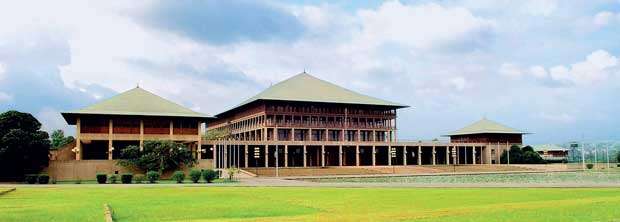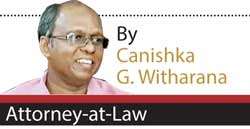Reply To:
Name - Reply Comment
Last Updated : 2024-04-25 13:23:00

 One of the objectives of the 19th Amendment to the Constitution was to restrict powers of the President to dissolve parliament within four and-a-half years. Was that objective successfully achieved? My reading of the constitution is the opposite.
One of the objectives of the 19th Amendment to the Constitution was to restrict powers of the President to dissolve parliament within four and-a-half years. Was that objective successfully achieved? My reading of the constitution is the opposite.
Firstly, the reader is advised to be cautious not to treat my contention as final. This is only an academic exercise to explore the true intention of the legislature on a plain reading of the relevant Articles (Sections) of the Constitution.
Prior to the 19A Article 70 (1) directly dealt with the President’s powers to dissolve the Parliament; i.e. “The President may, from time to time, by Proclamation summon, prorogue and dissolve Parliament:”There were several provisos to the above article with restrictions.
The 19A deleted the words “time to time” and included a proviso preventing the president from dissolving parliament until a lapse of four and-a-half years from the first meeting;
“70(1) The President may by Proclamation, summon, prorogue and dissolve Parliament:
Provided that the President shall not dissolve Parliament until the expiration of a period of not less than four years and six months from the date appointed for its first meeting, unless Parliament requests the President to do so by a resolution passed by not less than two-thirds of the whole number of Members (including those not present), voting in its favour”
Very strangely, sub-article 70(5) recognizes two modes of dissolution; they are as follows:-
5 (a) A Proclamation dissolving Parliament shall fix a date or dates for the election of Members of Parliament, and shall summon the new Parliament to meet on a date not later than three months after the date of such Proclamation.
The 19A deleted the words “time to time” and included a proviso preventing the president from dissolving parliament until a lapse of four and-a-half years from the first meeting
(b) Upon the dissolution of Parliament by virtue of the provisions of Paragraph (2) of Article 62,”The President shall forthwith by Proclamation fix a date or dates for the election of Members of Parliament, and shall summon the new Parliament to meet on a date not later than three months after the date of such Parliament”
Sub-Article 75(5) (a) refers to the mode of dissolution provided in Article 70(1) and Sub-Article 75(5)(b) recognizes the mode in Article 62(2).
Then the next question is whether the Article 62(2) refers to a separate mode of dissolution. Here again we see a discrepancy between the Sinhala and English texts in the construction of this Article.
The English text reads as follows;
“Unless Parliament is sooner dissolved, every Parliament shall continue for five years from the date appointed for its first meeting and no longer, and the expiry of the said period of five years shall operate as a dissolution of Parliament”
On the face of it the term “dissolution” refers to an automatic incident of dissolution by operation of law on expiration of a term of five years.
However, the Sinhala text categorically specifies a stand alone mode of dissolution within a period of five years. This difference is resulted by drafting this Article in three separate sentences. The translation is produced (to the nearest meaning) as follows;
“Every Parliament shall continue for five years from the date appointed for its first meeting and no longer. However, Parliament can be dissolved before expiration of the (said) (stated) period. However on the expiry of the said period of five years Parliament to be considered as dissolved”.
It is to be noted that when there is an inconsistency between the texts the Sinhala Text prevails (Sec 48 of the 19th Amendment).
The Literal meaning given in the Sinhala text of Article 70(5)(2) is “When Parliament was dissolved by virtue of Article 62 sub Article (2)...”. As aforesaid the Sinhala text of 62(2) provides for a (second) mode of dissolution. Both these Articles (in the Sinhala text) are constructed to mean an act of dissolution caused upon the Parliament; but no automatic dissolution by operation of law.
However, Article 62(2) does not refer to a person having the authority to do the act of dissolution (Actor). Then there should be a reference somewhere else in the Constitution to a person with powers to execute the act of dissolution.
The answer is in Article 33(2)(c) of the Constitution. The 19A introduced the following sub-article (c) to Article 33(2) which deals with specific powers of the President. The new sub-article is read as follows;
“ 33(2) In addition to the powers, duties and functions expressly conferred or imposed on or assigned to the President by the Constitution or other written law, the President shall have the power- (c) to summon, prorogue and dissolve Parliament”
The question is whether the powers specified in Article 33(2) are stand-alone or subject to Article 70 which restricts dissolution within four and-a-half years.
To answer we have to look into other powers given to the President by Article 33(2). They include (i) to make the State of Government Polity at the commencement of the parliamentary session (ii) to preside at ceremonial sittings of Parliament (iii) to appoint Ambassadors and High Commissioners (iv) Appoint President’s Counsel (v) to Keep the public Seal of the Republic and engage in relevant functions stated therein (vi) to declare war and peace (vii) to do other things not inconsistent with the constitution and law.
All these are specific powers conferred on the President “in addition to” the powers and duties and functions expressly conferred or imposed on or assigned by the Constitutionor any other law. The words “in addition” make this sub-article standalone conferring additional (specific) powers apart from those entrusted on the president by the other Articles. In the circumstances the powers given to the President to dissolve by Article 33(2)(C) are in addition to powers given by Article 70(1).
Therefore on a plain reading of Article 33(2)(c) with 62(2) and 70(1) it is clear that the constitution has opened two independent avenues for the President to dissolve the parliament.
On the other hand, it is also reasonable to argue that the President has powers to act on Article 33(2)(c) alone without having recourse to Article 62(2), as Article 33(2)(c) is authoritatively independent.
The next issue is whether the President has a choice between the two Articles to act upon.
Only few, among several, specifically refer to Article 70. One of them is Article 48(2); i.e:-
“If Parliament rejects the Statement of Government Policy or the Appropriation Bill or passes a vote of no-confidence in the Government, the Cabinet of Ministers shall stand dissolved, and the President shall, unless he has in the exercise of his powers under Article 70, dissolved Parliament, appoint a Prime Minister, Ministers of the Cabinet of Ministers, Ministers who are not members of the Cabinet of Ministers and Deputy Ministers in terms of Articles 42, 43, 44 and 45”.
The above Article compels the President to appoint a new Prime Minister upon occurrence of the three incidents (e.g. defeat of appropriation bill; i.e. budget) refers to therein; if such had happened within four and-a-half years from the first meeting of the parliament. In Sri Lanka sovereignty is in the People. Sovereignty includes powers of government (Art.3). The executive power of the people shall be exercised by the President elected by the people (Art.4(b). The President is the head of the State, head of the Executive and of the Government (Art 30(1). The Cabinet of Ministers charged with the direction and control of the Government (Art.42(1). The President shall appoint as Prime Minister the Member of Parliament, who, in the President’s opinion, is most likely to command the confidence of Parliament (Article 42(4).
In Sri Lanka sovereignty is in the People. Sovereignty includes powers of government (Art.3). The executive power of the people shall be exercised by the President elected by the people (Art.4(b)
If the President cannot form an opinion as to the person commanding the confidence of Parliament to appoint as the next Prime Minister or if due to defeat of budget or for any other reason the President (being the head of the Government) finds the stability of the Government cannot be sustained or would collapse (which endangers the governance of the country), there should be an alternative mechanism provided in the constitution to uphold the sovereignty of the people and ensure national security. In such situations it would be dangerous and disastrous to run the country with an unstable government until lapse of four and-a-half years to dissolve the Parliament. The solution to this dilemma is provided in Article 33(2)(C) (read with / without Article 62(2). That is the second mode available in the constitution for the president to dissolve the parliament without waiting for four and-a-half years.
Dissolution ends the life of the existing parliament. According to A.V. Dicey (a British Whig jurist / constitutional theorist) Crown has the right of dissolution in extreme circumstances. He wrote “A dissolution is in its essence an appeal from the legal to the political sovereign. A dissolution is allowable, or necessary, whenever the wishes of the legislature are, or may fairly be presumed to be, different from the wishes of the nation” According to him the objective of dissolution is to “Ascertain that will of parliament coincides with the will of the nation”.
Referendum
To ascertain the will of the nation and to obtain the sanction directly from the people to dissolve the parliament the President has another option. That is to hold a referendum under Article 86 of the Constitution. Under that “The President may, subject to the provisions of Article 85, submit to the People by Referendum any matter which in the opinion of the President is of national importance”.Referendum is a manner in which the People exercise their Sovereignty (Article 4(a) and (e).
If the President (head of the Government) finds the Government is in a crisis situation, which prevents him from carrying out his executive functions (as the head of the executive) through the machinery of Government, the constitution authorizes the President to submit that matter to the people as of national importance. Finally the people will have to resolve the confusion created by the politicians.

Add comment
Comments will be edited (grammar, spelling and slang) and authorized at the discretion of Daily Mirror online. The website also has the right not to publish selected comments.
Reply To:
Name - Reply Comment
US authorities are currently reviewing the manifest of every cargo aboard MV
On March 26, a couple arriving from Thailand was arrested with 88 live animal
According to villagers from Naula-Moragolla out of 105 families 80 can afford
Is the situation in Sri Lanka so grim that locals harbour hope that they coul